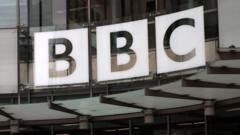Can BBC's Apologies and Promises Resolve Its Twin Crises?

The BBC's Current Crisis: An In-Depth Analysis
In a tumultuous period for the British Broadcasting Corporation (BBC), the organization grapples with two significant controversies that have sparked public outrage and concern about its integrity and accountability. The recent failings in its programming have not only led to public apologies and action plans but have also raised questions about the future of the corporation itself. This article delves into the intricacies of the ongoing issues, the implications for the BBC, and what this means for its audience.
Understanding the Wallace Misconduct Allegations
The first wave of controversy centers around allegations of misconduct involving former BBC presenter Huw Wallace. Reports suggest a troubling culture within the BBC, where some presenters may have operated under different standards than their colleagues. This issue has prompted a renewed focus on accountability and oversight, particularly in light of a recent culture review aimed at addressing these discrepancies.
Background of the Wallace Case
In 2019, Kate Phillips, the current Chief Content Officer, reportedly warned Wallace about his behavior. Following this admonition, no further complaints were escalated to BBC management. This lack of escalation has led the BBC to argue that they believed the situation was resolved. However, the question remains: did the BBC truly address the issue, or did it merely create a facade of resolution?
The Cultural Implications
The Wallace allegations have opened a Pandora's box of questions about the internal culture at the BBC. Critics argue that if the corporation had a culture of impunity for certain individuals, it reflects broader systemic issues. The recent culture review aims to mitigate such problems, but the effectiveness of these measures remains to be seen.
The Gaza Documentary Controversy
The second controversy revolves around the BBC's documentary titled "Gaza: How to Survive a Warzone," which has sparked an investigation by the regulator Ofcom. The documentary has been criticized for misleading audiences regarding the identity of its child narrator, who is the son of a Hamas official. This revelation has led to a significant erosion of trust in the BBC's coverage of the ongoing conflict in Gaza.
Trust and Transparency Issues
Trust is a cornerstone of journalistic integrity, and the BBC's failure to disclose the child's background has fed into broader accusations of bias. Critics claim that the BBC's coverage has failed to adequately address the complexities of the Israel-Gaza conflict, leading to perceptions of partiality. The organization has faced allegations of antisemitism, particularly regarding its decision to broadcast content that some view as biased against Israel.
The Impact of External Pressures
Adding to the controversy, the BBC faced backlash over its handling of a live performance at the Glastonbury Festival, where the punk duo Bob Vylan made inflammatory comments. Critics argue that such occurrences reveal a failure in the BBC's editorial oversight, further exacerbating the perception of bias in its reporting.
The BBC's Response and Accountability Measures
In response to these controversies, the BBC has publicly committed to taking "fair, clear, and appropriate action" to ensure accountability within its ranks. However, the question remains: will any individuals face consequences for their roles in these failings? The culture of accountability, or lack thereof, within the BBC has become a focal point for both internal and external critics.
Leadership and Accountability
Director General Tim Davie and Chairman Samir Shah have met with key stakeholders to reassure them of the BBC's commitment to transparency and accountability. However, the growing sentiment among critics is that mere reassurances may not suffice. Many are left wondering if real change will occur, or if the BBC will continue to operate under the same problematic culture.
The Broader Context: Reporting on the Israel-Gaza Conflict
The challenges facing the BBC in reporting on the Israel-Gaza conflict are unprecedented. Journalists are often caught in a crossfire of competing narratives, with both sides demanding partisan reporting rather than impartial journalism. This has placed immense pressure on the BBC, which prides itself on its commitment to balanced reporting.
The Role of Fear in Coverage
Insiders have suggested that a "paralysing atmosphere of fear" has influenced the BBC's coverage of Gaza. This claim, whether true or not, undermines the BBC's assertion of impartiality and raises valid concerns about the effects of external pressures on journalistic integrity.
The Implications for the BBC's Future
The BBC's credibility is under scrutiny, and the implications of these controversies could extend far beyond the immediate fallout. The need for charter renewal looms large, and the corporation must demonstrate its commitment to reform and accountability if it hopes to maintain public trust.
Future Directions and Reform
As the BBC attempts to navigate these crises, the path forward will require a concerted effort to address both cultural and systemic issues within the organization. The recent controversies have highlighted the urgent need for reform, particularly in terms of transparency, accountability, and editorial oversight.
Conclusion: Can the BBC Restore Trust?
The BBC stands at a crossroads. With two major controversies rocking its foundation and public confidence wavering, the corporation must take decisive action to restore trust. Whether through enhanced oversight, a commitment to impartial reporting, or accountability for past failings, the future of the BBC depends on its ability to adapt and evolve in the face of criticism.
As audiences demand transparency and integrity, the BBC faces an uphill battle to reclaim its reputation. Will it rise to the challenge or continue to falter under the weight of its controversies? The answer may determine the BBC's relevance in an increasingly fragmented media landscape.
FAQs
What are the main controversies currently affecting the BBC?
The BBC is currently facing controversies surrounding allegations of misconduct related to former presenter Huw Wallace and the fallout from its Gaza documentary, which has sparked public outrage and a regulatory investigation.
How has the BBC responded to these controversies?
The BBC has publicly apologized and announced action plans aimed at addressing the issues. However, there are ongoing questions about accountability and whether anyone will lose their job as a result of these failings.
What implications do these controversies have for the BBC's future?
These controversies could significantly impact the BBC’s credibility and its ability to secure charter renewal. The future of the organization may depend on its willingness to implement reforms and restore public trust.
The BBC is navigating a challenging landscape, and the resolution of these controversies will be crucial to its future. Can the BBC restore its reputation and reclaim its role as a trusted news source? #BBC #MediaEthics #GazaConflict
Published: 2025-07-14 19:30:49 | Category: technology


